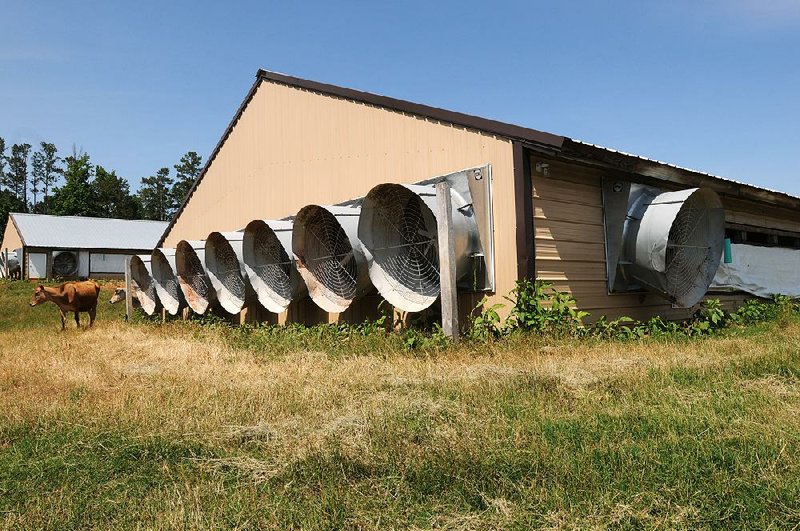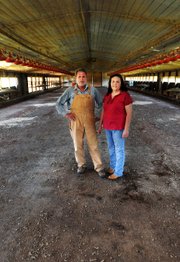SPRINGDALE - A new report by FarmAid, the farmer advocacy group founded by country music legend Willie Nelson, takes Tyson Foods Inc. and other large meat companies to task over their dealings with contract farmers.
Titled “Life Under Contract: Poultry Farming in Arkansas,” the report describes contract farmers as “all but serfs in a feudal economic system that funnels profits to the integrators.” Some contract growers contend that Tyson and others have repeatedly required upgrades on the growers’ facilities while refusing to raise compensation.
Tyson counters that it has kept payment rates for growers at profitable levels even during periods when the company was losing money on every bird it was selling.
Karen and Mitchell Crutchfield, who operate Granny Creek Farm in Lamar, contend that the system is tilted heavily in favor of the meat companies.
“It’s been a very unfair system with Tyson,” Mitchell Crutchfield said. “ There’s none of it that’s turned out like we were told it would be.”
In a typical poultry-grower contract, the grower owns the farm and facilities, and provides the labor to raise the birds. The processor provides the birds, plus feed and technical assistance to raise them.
Gary Mickelson, a Tyson spokesman, said it is in the company’s best interest for the contract growers to succeed.
“We’ve been working with poultry farmers on a contractual basis since the late 1940s, and it’s been a relationship we believe has worked effectively for both the farmer and the company,” he said. “There are currently more than 4,000 independent farmers who raise chickens for us, and we frequently receive inquiries from other people interested in getting into poultry farming.”
Among the costs that the Crutchfields have faced over years are tied to stricter management of poultry litter thatcan be applied to pastures and cropland, and stricter rules on the disposal of dead birds.
“That’s all for the good, I’m not complaining, but Tyson never allowed us any money for that stuff,” Mitchell Crutchfield said.
Reluctant to go further in debt to meet Tyson’s additional mandates, he said, the Crutchfields filed a Chapter 12 bankruptcy case so they could hold onto their farm.
“We did not have any other choice,” Karen Crutchfield said. “We’ve been trying to bring a light to the problem, to bring a light to the community, to make sure young people don’t get trapped like we did.”
Bruce Webb has been raising broilers off and on for Tyson’s Clarksville complex for 25 years. His experience, he said, has been that when Tyson requires upgrades, the company usually pays for the upgrades through changes in its contracts with growers. If the upgrade required additional fans in the growing houses, he said, Tyson would raise its payment to the grower by half a cent a pound.
As a grower, he said, he got that money back over time.
“If you take care of that bird, you make more money. I have not seen any of their requests for updates that probably were not needed,” he said.
Some growers have elected not to upgrade, he said, noting that over a 10-year period, a poultry house gets so out of date that “it’s a huge financial investment to bring them up to standards.”
Broilers are bigger than they used to be, he said, and require more ventilation than in the past.
“In general, the old-type ventilation just doesn’t do the job for these bigger birds,” Webb said.
Jamie Statler, a grower for Tyson, described his experience as positive. He also had worked for Pilgrim’s Pride Corp. before it went into bankruptcy and emerged as part of Brazilian meat company JBS SA.
He hooked up with Tyson, despite having to make some upgrades to his operation.
“In my eyes, we all have to do what we can to improve our performance and to improve the company’s performance,” he said. “I’m sharp enough to know we have to keep up with the competition.”
His operation includes 155 acres with three poultry houses, plus a 25-head cow calf business.
“The chicken business is a highly competitive business,” he said. “I’ve always looked at agriculture as more a lifestyle than a business. I pay my bills, and I’m making a living. They were good enough to pick me up when I needed to go with them.”
Mickelson, the Tyson spokesman, said many poultry growers have upgraded their facilities to include solid side walls rather than curtains, and have installed computer-controlled ventilation and heating. The modern housing, he said, provides a more comfortable environment, a uniform temperature throughout the building and lower energy costs.
“Even if the base pay for the farmer remains unchanged, the increased production due to the housing upgrades will increase the farmer’s total pay,” he said.
Business, Pages 71 on 06/16/2013


